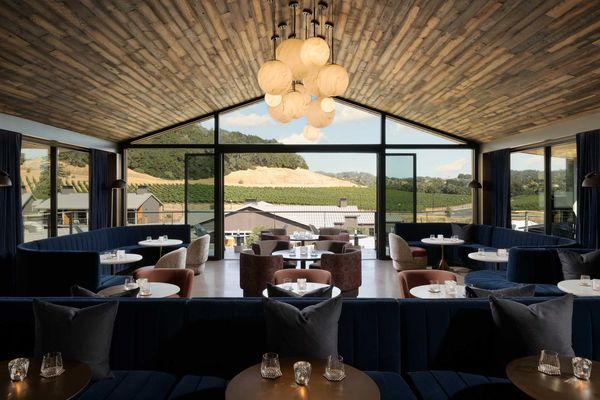The tradition of the much-hyped restaurant opening plays an undeniably important role in the business, drawing customers into a heavily leveraged dining room at a critical juncture. But a restaurant's debut isn't necessarily a defining event—rather, one of a multitude of events in the circuitous path that constitutes the evolution of a restaurateur. Or in the case of the two-and-a-half-year-old restaurant, Lord Stanley, two restaurateurs.
Of equal importance here are three historical facts. 1: When Rupert Blease was 10 years old, his parents emigrated from England to the South of France, exposing their son to a kind of cuisine, and attitudes about food, that he was unlikely to have encountered in Britain in the 1980s and '90s. 2: When Carrie Blease (then Carrie Puffer) was studying at San Francisco State University in the early 2000s, she paid a visit to the California Culinary Academy, and decided her future was in restaurants. 3: In 2004, while learning the ropes of entremets (vegetables and garnish) on the second day of her internship at Raymond Blanc's Le Manoir aux Quat' Saisons in Oxford, Carrie Puffer met Rupert Blease, who, at the time was on fish, which, owing to the structure of the brigade de cuisine, works closely with entremets.
For Carrie, Le Manoir was something of a baptism by fire. "It was my first restaurant job ever—a crash course in restaurant work. I learned very fast that it's a you-get-it-quickly-or-you're-not-going-to-make-it kind of thing. It's a big kitchen. If someone was struggling, it was apparent that it was hard for everyone." For Rupert, meanwhile, who moved to Oxford with somewhat more work experience—including several stages in southern France; and jobs at L'Amphitryon in Toulouse and at Les Fermes de Marie in Megève in the French Alps—Le Manoir "was awesome—an extremely good kitchen. The food was very, very good, all the techniques were very good, and everything was done properly. It was a game changer, to see how good food could be, and how much I had to put into it."
A romance developed as well. "As we spent so many hours working together," Rupert explained, "we got to know each other very quickly." By the end of the following year, said Carrie, "we were obviously going to go somewhere together."
Somewhere turned out to be New York, where they married, and quickly found work: she at Blue Hill; he at Per Se. Then to London, where the pair worked side by side at Texture, the Icelandic chef Agnar Sverrisson's restaurant in Marylebone; and at an upscale nightclub among whose appeals was a relatively leisurely schedule that allowed them time to travel, as well as enjoy the city's attractions, including a pub in Camden Town called The Lord Stanley, which became a ritual haunt. In 2010, the two moved to San Francisco. While Carrie worked at Commonwealth, and Rupert at Central Kitchen, they began laying the groundwork for their own venture: something something refined yet casual, based in classical French cuisine, but incorporating elements from other European traditions, as well as an emphasis (inspired by a culinary tour of Japan) on a kind of elemental simplicity.
When a decades-old Thai restaurant on the corner of Polk and Broadway ended its lease, they made their move, and in June of 2015, opened Lord Stanley, an ode both to Rupert's late father, and to the couple's favorite London pub. Within months, they earned a Michelin star, which they've retained ever since.
On a chilly evening last week, my wife and I found ourselves seated, somewhat appropriately, between a couple from Britain and a French family. With the excitement that sometimes overwhelms a person contemplating an exceptionally enticing buffet, we chose a la carte (which offers four "bites," four starters, four mains and four desserts) rather than the $97 tasting menu, and considered our options while sipping a 2012 Bourgeois-Diaz 3C Cuvee Champagne, an enchanting duet, equal parts lemon and ripening pear. (The restaurant's wine director, Louisa Smith, who merits a story of her own, has won accolades for her work, which focuses on small-production natural wines. Smith is also a winemaker, and bottles under the label Louisa Mary Smith.)
Gougeres seem to be a thing now—why it took them so long to become a fad is a bit of a mystery—but I've never enjoyed any quite like Lord Stanley's, which were filled with a Gouda mornay and garnished with piccalilli, a British take on Indian pickles, seasoned in this instance with mustard and turmeric. Previously, I wouldn't have thought to try to improve on a gougere's essential perfection, but the tangy, relishy sweetness of the pickly bits, and their soft crunch, unquestionably added a new dimension of deliciousness. This is to say nothing of the shavings of Piave Vecchio, a hard cow's-milk cheese from the Veneto similar to Parmigiano Reggiano, only more subtle in flavor.
(Robin Stein)
Lord Stanley sits at the intersection of Polk and Broadway, the nexus of the Marina, Russian Hill and Pacific Heights.
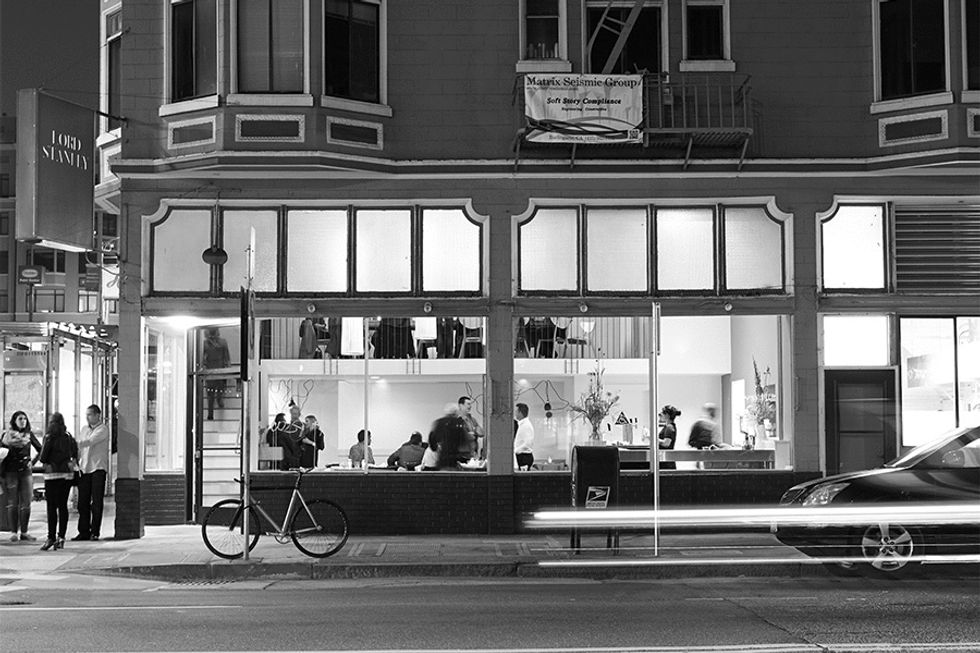
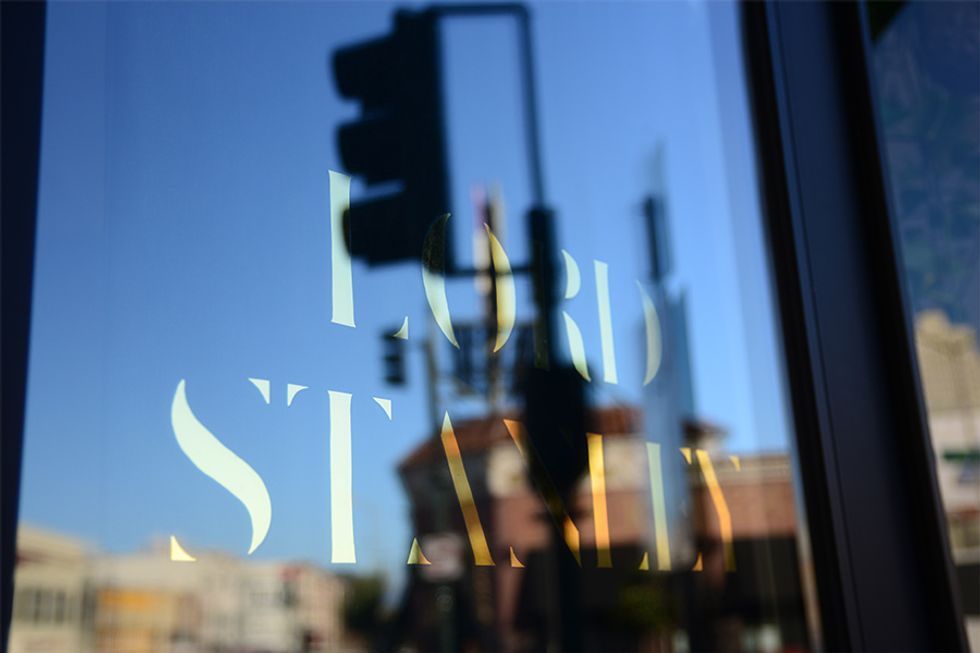
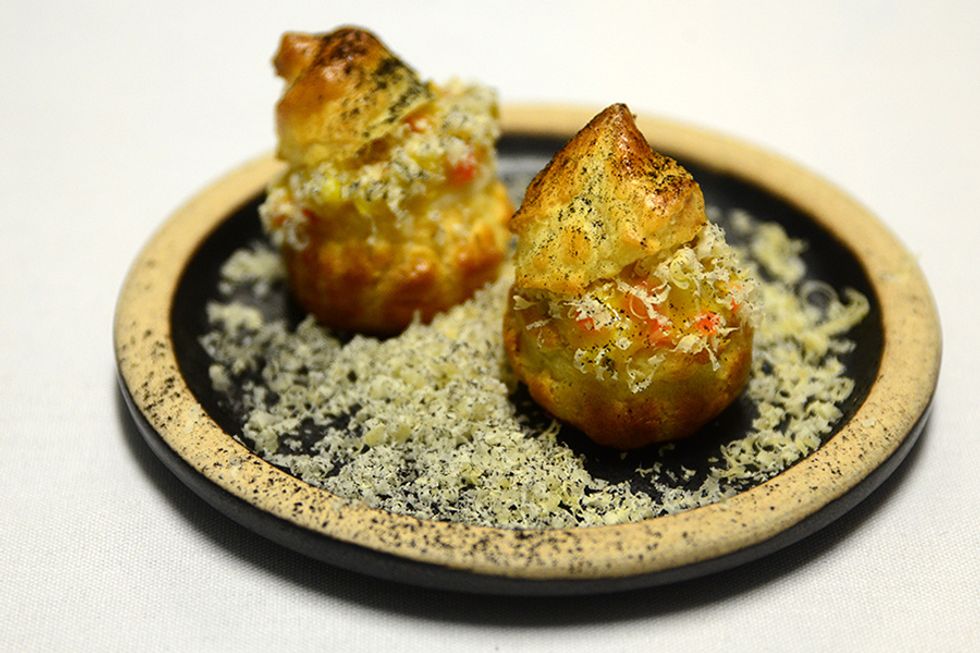
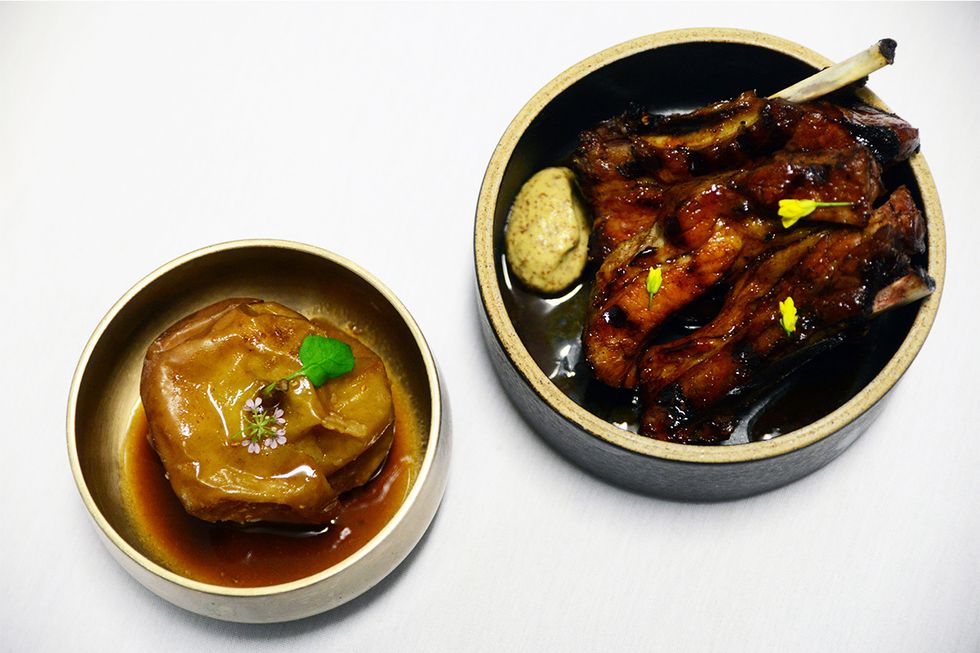
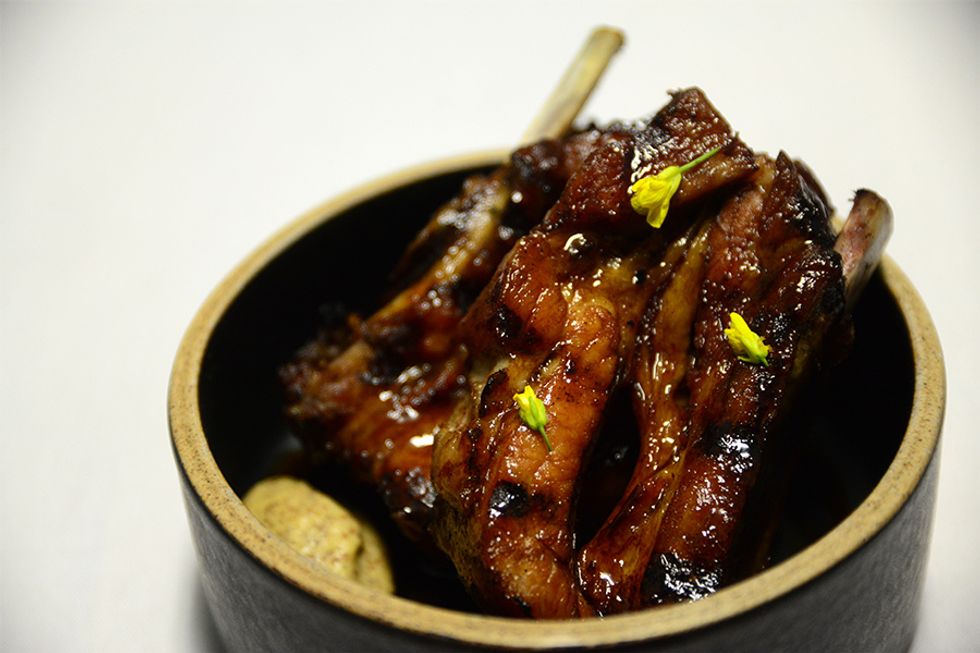
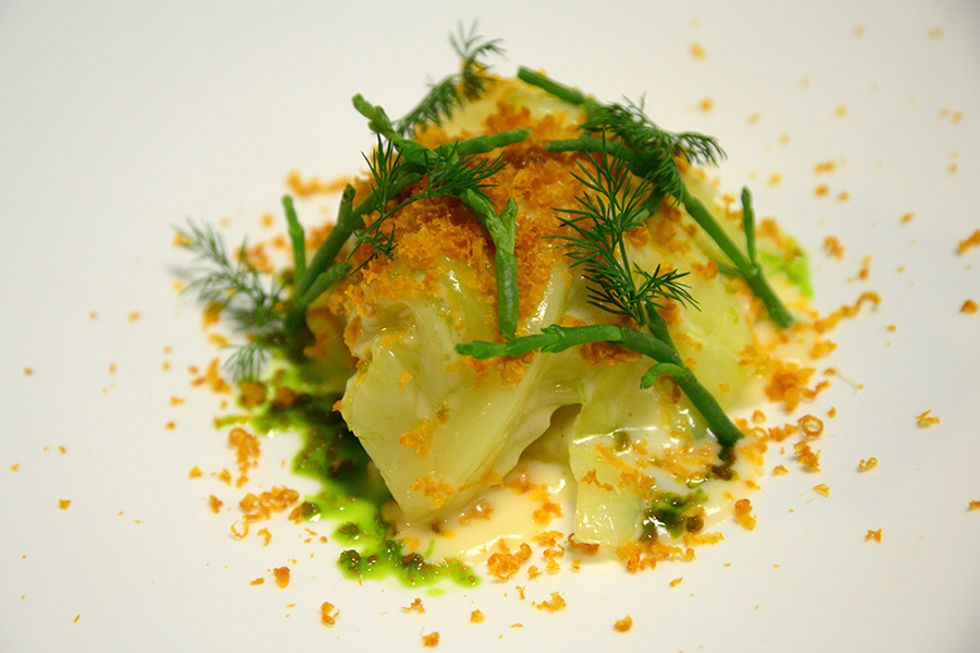
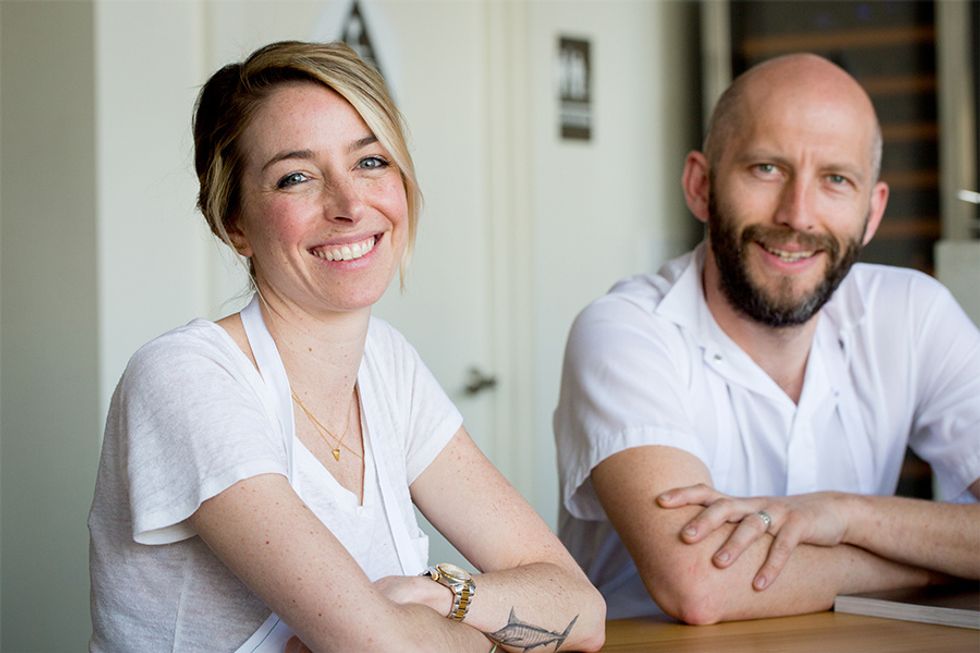
On the subject of improvements, the Bleases have devised a way to make salt cod—something of an acquired taste, which you will know if you've ever studied the Portuguese bomblet, bolinho de bacalhau, or its Venetian counterpart, baccalà fritto—appealing to the masses. Their trick: cure the cod in-house, mix it into a Provençale brandade, and serve it in the form of a beignet, fried to a soft crisp in a light sourdough batter.
A fan of fungi, I couldn't resist the idea of trumpet mushrooms—great, meaty representatives of the species, grilled to a T and served with a sweet-nutty-umami squash-and-miso dip, which played nicely off the pleasingly sour notes of a 2015 "La Corte dei Merli," made from the black-skinned Freisa grape, by the Piedmontese producer, Enio Ferretti.
Then a scallop—big and tender, with a fine, delicate flavor—seared to a golden crust, and garnished with sweet, stickily-chewy slivers of candied parsnip and a softly savory buerre blanc and poultry jus. And grilled Berkshire pork ribs—in a scrumptious glaze made from pork stock, apple juice, molasses and honey caramel—finished with a bit of salt and lemon juice, and accompanied by a salt-baked apple which, decorated with a tiny flower and an arugula leaf, resembled a confectioner's marzipan folly.
Although we hadn't ordered it, we were more than grateful when the kitchen sent out a dish of cabbage, cooked sous vide with butter and salt, dressed in a sauce of buttermilk (a happy by-product of the restaurant's own cultured butter), and garnished with sea beans (the tender and salty green shoots of the native succulent, Salicornia pacifica), dill, and shavings of cured sea urchin whose flavor somewhat resembled that of dried caramelized onions dipped ever so briefly in the sea.
Figuratively, I could have gone on like this forever, but literally, not, and deferred to the powers that be on the matter of dessert: a Pavlova—an understated dollop of meringue filled with mandarin oranges and citrus jelly—the thought of which has been haunting me ever since. Whether it will be there on my next visit, I don't know, as every week, a new dish or two comes along, displacing one or two others. Perhaps the Pavlova will circle back some day, like a small planet.
Lord Stanley isn't the sole locus of evolution. The Bleases are working on another project, which they were hesitant to describe in more detail than to say that it would be "something more casual." As its debut approaches, it will no doubt be accompanied by the usual flurry of hype, which never excites me particularly, as hype has no flavor. But as soon as their new idea should become a reality, I hope to be among the first through its doors. // 2065 Polk Street (Nob Hill), lordstanleysf.com






